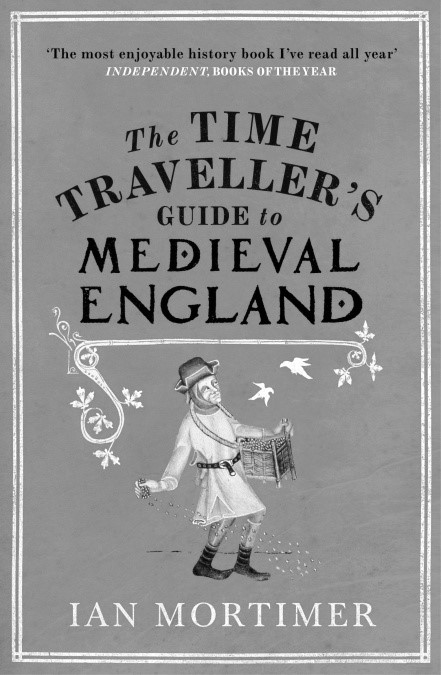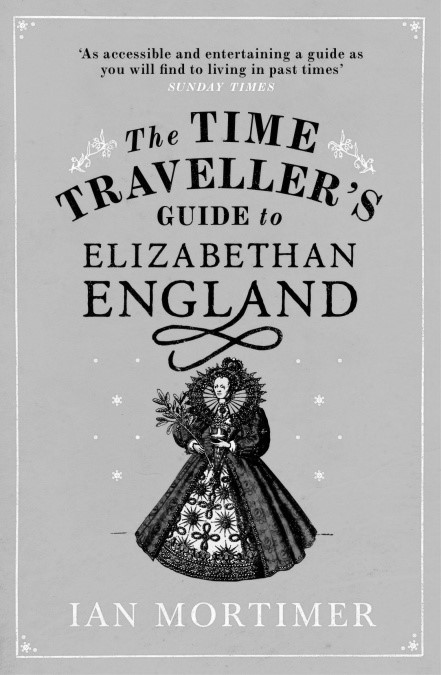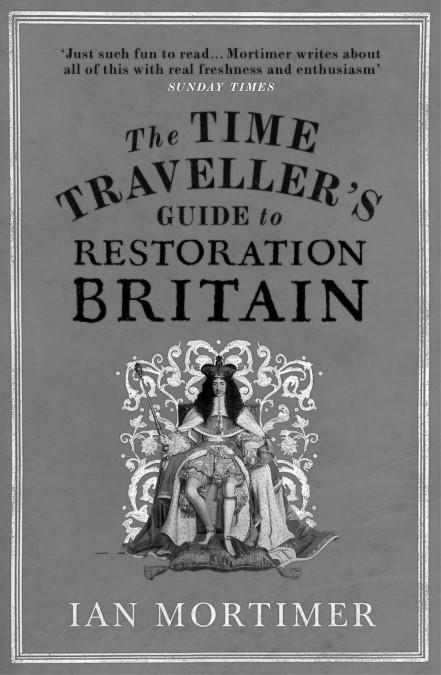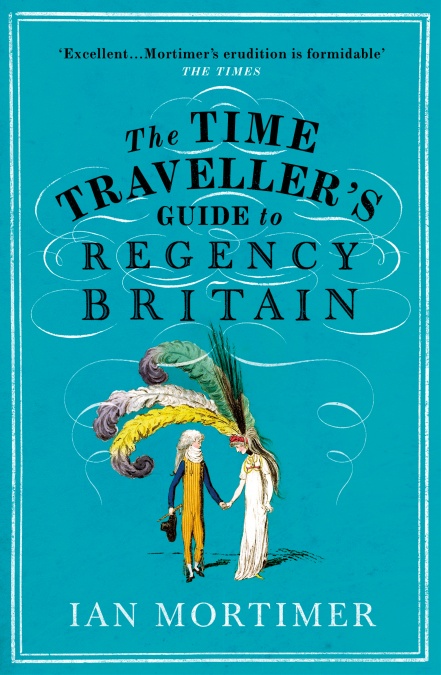|
The Time Traveller's Guide to Cutting Room Floor The original draft of this book came in at more than 220,000 words, so quite a lot had to be cut to bring it down to 152,500, its eventual length. Sadly some choice anecdotes and details had to go. Here I present a few passages that had to be sacrificed for the benefit of the book as a whole.
The naked duellistTo the modern reader, the idea that the best way to settle an argument is to allow your adversary to point a loaded gun at you and pull the trigger is ridiculous to the point of madness. Indeed, in its extreme seriousness, it seems almost to mock itself. Humphrey Howarth, MP and surgeon, is challenged to a duel by Lord Barrymore in July 1806 as the result of an argument over a game of whist at the Castle Tavern, Brighton. The following morning, Howarth turns up at the appointed place to defend his honour - and so does Lord Barrymore, each man with a brace of pistols - only Howarth is stark naked. Lord Barrymore demands to know what he means by this. The wily MP replies: 'I know that if any part of the clothing is carried into the body by a gunshot wound, festering ensues, and therefore I have met you thus.' Lord Barrymore declares he cannot shoot a naked man and departs. You see what I mean? Taking the duel to even greater heights of ludicrousness seems appropriately mocking of the whole charade, and thus almost sane. And yet, and yet... To think like this - so cynically, so complacently and so disdainfully - is to miss something important about the Regency character. There is more going on here than a bunch of rich idiots being reckless. The real reasons for fighting duels in the above cases are not because someone cheated at whist or trod on someone else's heels. They are fought because gentlemen with public reputations stand accused of lying or being arrogant - of being dishonourable and thus ungentlemanly. Thomas Creevey gives another insight into the importance of gentlemanly honour in 1818, when replying to Henry Bennet MP about the election of a new leader for the Whigs: 'I think you deceive yourselves by supposing that the leader of the Whigs of England to be an article that can be created by election... A man must make himself leader by his talents, by his courage, and above all by the excellence and consistency of his public principles'. In other words, a leader must not just say he is honourable, he must prove it - even if that means fighting a duel. You cannot be a public figure in Regency society and not be seen to stand up for what you believe in, even in the face of death. Although I do suggest that you keep your clothes on. Everyday sexismAs we have already seen, there are deep-seated prejudices against the fairer sex: legal barriers restricting their freedom and social prejudices that disadvantage them in both the home and the workplace. Unfortunately, the sexism does not stop there. One could easily write a whole book about how poorly women are treated by men and other women around the turn of the nineteenth century. Space does not allow for that, but a few cautionary indicators might be illustrative. We need to begin with the obvious point - that society objectivises women. Louis Simond is a perfectly readable and engaging author but, like everyone else, he has no qualms about describing women in terms of their physical appearance. When he is in Scotland, he talks about the ugliness of the working-class women there, and when in Lancashire, he cannot help but comment on how beautiful he finds them. So what? Noticing female pulchritude is what most men do in all ages, and they will admit it, if they are honest. Women too observe and comment on female beauty, not only in terms of competitiveness when they seek male attention but also for the attractiveness of the future generations of their family. Few mothers meeting a prospective daughter-in-law for the first time are not going to consider her face, figure, smile and stature. But you cannot quite imagine a twenty-first-century French travel guide containing the following information:
Nor is this trend to judge females by their appearances simply a matter of French taste. Here is an Englishman's view of French women:
The question is, will this bother you? Consider this advertisement from The Times for 7 February 1793. The gentleman advertiser is seeking a lady as follows:
The last uses of a scold's bridleIf the ducking of women seems barbarous and hardly conducive to marital bliss, what should we make of the scold's bridle? Robert Southey remarks that in Newcastle-under-Lyne, they have 'a curious custom of punishing scolds, by putting a bridle and bit into the mouth of the offender, so as to confine her tongue, and leading her in this manner through the streets as an example'. He adds that this practice and that of ducking 'are barbarous customs, and ought to be wholly disused'. I am sure you agree. But you can guess what I am going to say next. The scold's bridle - or brank, as it is called in the north - has not yet silenced its last victims. In 1799 James Brodie, a blind young man who has been committed to Nottingham Gaol on suspicion of murdering his eight year-old guide boy by beating him to death with a stick, makes so much noise in his cell overnight that the gaoler decides to use a brank on him. It is later ordered to be destroyed by the magistrates. Another is used at Altrincham in the 1820s. In Shrewsbury they have one ready and waiting throughout the Regency period - its last application to some poor woman's head will be in 1846. Women's independenceSporting events attract huge crowds and allow women to put themselves publicly on a level footing with men. Following the 1,000-mile walking craze of 1815, Esther Crozier announces in October 1817 that she will set out to complete the fabled 1,000 miles in twenty days. Like most men, she does not achieve the target but that is not the point: she attempts it. Huge crowds turn out to watch such events - they want to bet on the outcome, of course - so failure can garner as much attention as success. All-women cricket matches occasionally take place, and all-women's rowing events too. A few days before Esther Crozier strikes her blow for female walkers, there is a sculling race for women between Chelsea and Battersea. But perhaps the most striking example of female sporting freedom in England is that demonstrated by the female balloonists and parachutists. Everyone knows it takes courage to fly in a balloon and even more courage to jump out of it. Yet certain women are prepared to do these things. Letitia Sage flies with the Italian balloonist Vincenzo Lunardi in 1785, thereby becoming the first Englishwoman ever to take to the skies. A number of Frenchwomen in particular demonstrate their courage to European-wide acclaim, most notably Jeanne Garnerin, who comes to England with her husband during the brief peace of 1802-3 and demonstrates ballooning and parachuting to crowds of amazed onlookers. RomanticismSome of the most obvious manifestations of romanticism are the poems you read and the art and architecture you see. In poetry, the trope of the medieval wandering knight, travelling through the unmapped and dangerous world, is a common one. John Keats employs it in his poem 'La Belle Dame sans Merci', for example. Lord Byron goes out to live such a life in reality on his grand tour to Albania, returning to write it all up with a style of waspish cynicism as well as romantic bravura, as Childe Harold's Pilgrimage. The key aim of all the romantic poets, it seems, is to take you beyond the horizons of everyday life into the extremes of love, lust, fear, despair, revenge and horror. In architecture, the romantic ideal is to build in the medieval, 'gothic' style, rather than the classical, as this reflects the wildness of life and unrestrained passion, whereas the classical idiom speaks much more of order and control. Lord Byron is lucky enough to have inherited his own family mansion built out of a partly ruined medieval monastery, Newstead Abbey, and in true romantic style, the premises comes complete with the skull of a medieval monk (dug up in the grounds) from which our noble hero fashions a goblet from which to drink wine. Not every romantic gentleman has a medieval abbey at his disposal, however; most have to build their own gothic pile. Perhaps the most striking example of the Regency gothic is William Beckford's Fonthill Abbey, a vast, cavernous, sprawling structure with a 300ft-high tower rising high above its dark heart. Indeed, darkness is a key feature of all that is truly romantic - the darkness of the supernatural, the darkness of the night and all its mysteries, and the darkness of all life's tragedies. And the darkness is metaphorical as well as actual. There's no such thing as a romantic comedy at this time. There are no romantic jokes. Having said that, romanticism is not all danger and darkness. There is a side to it which accentuates the beauties of nature. This is the age in which artists reach for the sublime - the epitome of perfection, especially in the natural world. This might be a perfect sunset, or a mountain view, or a terrifying storm at sea, or any view that will move you emotionally. Painters also are obsessed by the picturesque, especially the wild beauty of the Highlands, or a Welsh valley, or a ruined abbey by moonlight, a dark forest or a clifftop castle. Everyone who has a romantic heart will make sure he or she is seen to have an eye for the beauties of nature. Men and women of fashion are regularly portrayed walking in a wild scene, with the idea that they are fully appreciative of the perfection of the trees, mountains and lakes in the background. Such natural beauty is, again, something that is in conflict with the legalistic and restrictive aspects of everything that is classical, formal, rational, controlled, predictable - and because the two are in conflict, those who would resist the formal and classical are bound to reach for the mountains, the forests, rivers and stars. A rare case of compassion in courtPatrick M'Donald is accused at the Old Bailey of stealing a jacket worth 14s. He is therefore on trial for his life. But he is practically naked, and the members of the jury can see his ribs sticking out as he stands in the dock. One of them asks if he has eaten anything that day and he replies 'no, Sir, nor a bit the day before that'. He explains that he is fourteen years old and came to London as a cabin boy aboard an American ship that departed without him, leaving him destitute in an unfamiliar city. The only reason he took the jacket was because he was cold and hungry. The judge is forced to take this as a confession but he adds that he will recommend that he be shown mercy and is sure he will be pardoned. A silver coin then lands at the defendant's feet, tossed by someone in the gallery. Then another, and another. Soon the whole courtroom, moved to pity, is tossing silver coins to the boy, so he can feed and clothe himself when he goes free. Investigating crimesMost crimes are detected and reported by private individuals. There are some exceptions, especially with crimes against the state. Smugglers are almost never observed except by officers of the Preventative Water Guard (established in 1809) and its successor body, the Coastguard Service (established in 1822), who are specifically charged with watching out for them. But offences against the state account only account for less than one in ten criminal acts. The vast majority are against individuals, which normally are reported by that person, not discovered by a police force. Most sex crimes, thefts and cases of forgery or fraud need the injured party to make representations to the magistrates. Individuals therefore play a major role in all the policing that goes on: watching their neighbours, identifying and capturing offenders, and so on. In addition, they may take the lead in the investigation of a crime. In the case of the theft of Mr and Mrs Cowie's laundry in 1822 (mentioned in Chapter Seven), it is the Cowies themselves who track down their linen to the chandler's shop in Petticoat Lane, where they identify their garments by the initials sewn into them. Only then do they report the crime; two constables are sent to arrest the shop owner, Ann Parkins, on suspicion of receiving stolen goods. A similar case of do-it-yourself detection takes place in the case of an eleven-year-old publican's daughter, Mary Homewood, who is raped by a man to whom she has taken beer in May 1796, Mary's parents do not know at first what has happened because the girl is too ashamed to tell them. When they learn the true cause of her upset, due to her having contracted gonorrhoea as a result, they have her treated by a surgeon who fully examines her. When he reports to them that she has contracted the disease and her hymen has been broken, they visit the man's wife and ascertain that he does indeed have gonorrhoea. Following that, they go to a magistrate, who issues a warrant for a constable to question the offender, arrest him, and conduct him to a prison to await trial. As these instances show, the constable is a key figure in the administration of the law. The office is a burdensome one - and, more often than not, unpaid. The holder is selected from the principal inhabitants of a parish and serves for a year in English and Welsh parishes or six months in most Scottish towns. It is his duty to arrest anyone he believes may have committed a felony and to bring the suspect before a magistrate. He may also search premises and undertake such other duties as the local magistrates suggest, including organising the fighting of fires, cleaning the streets, repairing the roads, attending to the passage of vagrants, collecting the county rates, checking alehouse licences and transporting suspects to prison. In most large towns, the constables are assisted in their patrolling by the night watchmen or 'charleys', whose principal role is to watch out for thieves. They march around the neighbourhood calling out 'Two o'clock and all is well' or whatever time it is, or 'Four o'clock and a frosty morning'. In between the hours they remain on duty in their watch boxes, which are like sentry boxes - only large enough for one man to stand up in - set on the sides of the streets. It is a common sport among drunk roustabouts to creep up behind these boxes and tip them forward, spilling the man into the road and scarpering before he can extricate himself. Few pity the watchmen, who are mostly old fellows equipped with staves, lanterns and sometimes a rattle or a horn to alert people when a break-in is spotted. As Christian Goede puts it in his description of the capital: 'two thousand invalid, ill-paid, drunken watchmen are the guardians by night of the public safety. Such a miserable crew, even with the best dispositions, are unequal to the protection of the metropolis.' Before 1800, the London watchmen are not paid at all. Many make a few shillings by agreeing to turn a blind eye when thieves carry out their raids and thus actually help the criminal fraternity. Given the importance of constables, why do we not refer to these men as policemen? The magistrate Patrick Colquhoun explains in the preface to his influential book A Treatise on the Police of the Metropolis, first published in 1796:
SuperstitionIn 1810 a number of strange events take place in a house in the Devonshire village of Sampford Peverell. Women are beaten as they lie in their beds, and a sword is flung around by invisible forces or suspended in mid-air. Knocking, stamping, rapping and thumping sounds are heard. Bed curtains are suddenly rattled in the night, a large copy of the Bible is repeatedly thrown across a room, and a heavy iron candlestick moves by itself across a bedroom until it is suddenly hurled at the householder. A clergyman, the Rev'd Mr Colton, investigates and is at loss to explain. What is interesting, however, is the determination with which other people deny that these events have anything supernatural about them. The editor of the local paper starts a moral crusade against Mr Colton in order to show that the apparent poltergeist activity is actually the work of smugglers secretly using the house, or some other pests who simply want to worry the female servants. He and, one assumes, the majority of his readers, refuse to accept these events are paranormal. They proceed on the basis that everything is ultimately explainable. They dismiss people like Mr Colton as credulous. They call them 'ignorant' if they even use the word 'ghost'. Having said that, you will find elements of old beliefs lingering on, especially in rural communities. People still go into the fields in groups on the first of May to bathe their faces in the dew-touched grass in the hope that it will make them more beautiful. Couples still plan their weddings according to the old rhyme 'marry in Lent, live to repent'. They avoid crossing other people on staircases, walking under ladders, killing money spiders, chopping down holly trees and putting any other form of book on top of a Bible other than a prayer book. Some people refuse to be weighed as they think it unlucky. The Rev'd James Woodforde is also a strong believer in folk remedies. When a cow falls ill, he cuts open the tail and puts in a boiled onion and some salt. When a sty on his eye swells up, he rubs it with the tail of a black cat - initially with some good effects, although his scepticism goes so far as to make him question whether the cat actually has to be black. Similarly, people get confirmed at Christmas to ward off rheumatism. They keep Good Friday bread preserved for months as a cure-all. Down here in Devon, if a child has whooping cough, someone will split the trunk of a young ash tree vertically, and separate the two parts, and then pass the child through the cleft. Many a country house has a cat entombed in the walls or a chimney to guard against evil spirits. Even in sophisticated London, citizens bury witch bottles under the threshold or behind the hearth. And astrology has a compulsive hold over many people in all walks of life, as it does in all periods of our history. Advertisements such as this one, in The Times in 1795, are typical:
GamblingYou might think that nothing good can come of all this gambling. Many an established family will agree: they have nothing to gain and all to lose. 'The rattling of a dice box at White's may one day or other (if my son should be a member of that noble academy) shake down all our fine oaks,' declares Lord Lyttleton, adding 'what devastations are made by that destructive fury, the spirit of play'. However, you can find morality even in high-stakes gambling. In the 1790s a young naval officer manages to lose £100,000 in one sitting at White's. Calling a halt to his run of bad luck, he declares he will sell his estate to pay his debt. But the Irish gentleman to whom he has lost his family fortune refuses to accept more than £10,000 and suggests they play again for the other £90,000. This time, the naval officer wins, and his family's wealth and honour are maintained. |



